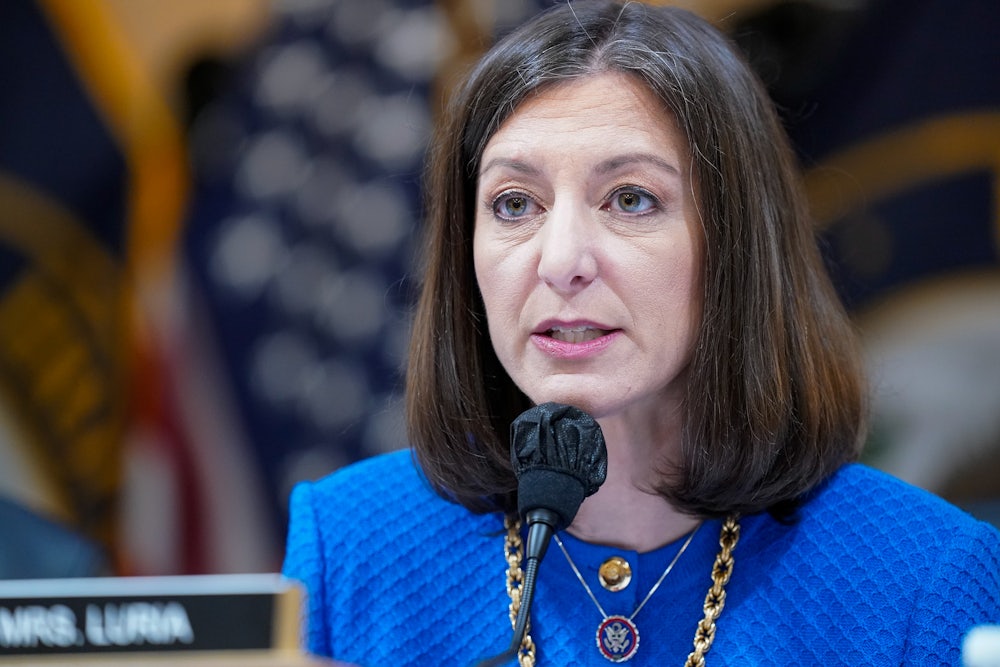There is a time-tested formula for a member of Congress facing a difficult reelection fight: Never deviate from a poll-tested message. Stay away from anything controversial that will rile up opposition and risk losing swing voters. And never, never, take on any task on Capitol Hill that will be a distraction from a single-minded quest for electoral victory.
That last point helps explain why the House’s nine-member January 6 committee was mostly populated by Democrats with safe districts and never-Trump Republicans who were either retiring or nearly assured of the martyrdom of losing their primary. Five of the seven Democrats on the committee won reelection this November with landslide margins of 15 percentage points or more. A sixth Democrat, Florida’s Stephanie Murphy, announced at the end of 2021 that she would be retiring from the House rather than running in a drastically altered, highly Republican district.
All this brings us to Elaine Luria, the most junior member of the January 6 committee and, in my view, the politically bravest Democrat in Congress.
Running for a third term from a redrawn southeastern Virginia district—which would be difficult terrain for any Democrat—Luria embraced her role on the January 6 committee and made it the centerpiece of her campaign. In her final TV ad, Luria spoke to camera as she said bluntly in her deceptively soft voice, “If you support insurrectionists and call our military weak, I’m not your candidate. If you attack the FBI and defend Donald Trump, I’m not your candidate. And if you believe the 2020 election was stolen, I’m definitely not your candidate.”
In the end, it wasn’t enough. Luria, a former Navy commander and a graduate of Annapolis, lost to Republican Jen Kiggans by 10,000 votes, a margin of 52 to 48 percent. Luria and most political insiders attribute her defeat to redistricting, which gave her seat (centered in Virginia Beach) enough of a GOP tilt that Republican Glenn Youngkin carried it by 11 points in his runaway 2021 race for governor.
In an interview this month, I asked Luria whether she thought her service on the January 6 committee made a major difference in her losing race. She paused for a moment before she said, flatly, “It made a difference to me.” She went on to point out that she had run 17 different TV ads during the campaign, which gave her an opportunity to talk about a wide range of issues. But, she stressed, “closing with that [January 6] ad to me was important because this is really the most important work that I’ve ever been part of. And I think it’s the thing that will endure.”
Luria, it must be stressed, was not running a kamikaze campaign or mounting a symbolic candidacy. Under the new map created by redistricting, Joe Biden carried Virginia’s 2nd district by two percentage points in 2020. But turnout was dampened in 2022 because there was no presidential or even statewide races on the ballot. Luria’s race in theory was winnable, even though Kiggans, the GOP nominee, was a former Navy helicopter pilot who managed to avoid coming across as a right-wing extremist. So Luria’s choice to emphasize her service on the January 6 committee was built around her faith in the patriotism of most voters in this Navy-dominated district. Ben Tribbett, a political consultant who worked for Luria, explained, “Since she was on the January 6 committee, which was a risk that she decided to take, it would have been a colossal mistake to run away from it.”
One of the more perplexing questions coming out of the 2022 midterms was the overall role of the January 6 committee in shaping the Democrats’ better-than-expected showing on November 8. The question on exit polls about the state of democracy was so vaguely framed that more Republicans than Democrats said that political freedom was “very threatened.” But it is telling that virtually every major election denier running for governor, from Kari Lake in Arizona to Doug Mastriano in Pennsylvania, went down to ignominious defeat. Postelection polling by Impact Research found that 60 percent of Democrats in contested House districts cited protecting democracy as a major motivation for voting. Kyle Kondik, who charts House races for Sabato’s Crystal Ball at the University of Virginia, recognized the irony in Luria’s race. “It is clear,” he said, “that January 6 messaging helped the Democrats nationally. But maybe not in Luria’s district.”
Despite her defeat, the career of the 47-year-old Luria in public service is probably not over yet. “I’m leaving a lot of doors open,” she said when I asked about her future. “I want to continue work related to what I’ve done in Congress. And a lot of that had to do with national defense and the future of the Navy.” Given the normal two-year turnover in a presidential administration, Luria, with her hawkish views on China and her fervent belief in naval power, may well be rewarded with a Biden job in the national security area. A 2024 rematch with Kiggans—which is apt to look far more promising in a presidential year in a Democratic state—is also a possibility. And at some point, a statewide race in Virginia might open up for Luria.
So Elaine Luria did not sacrifice all her future prospects on the altar of the January 6 committee. But in a political environment where risk-taking is a rarity, Luria bet her House seat on doing the right thing. And, as she told me, that was the price “for being on the right side of history.”






